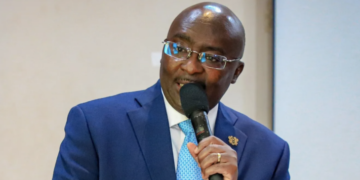Minister for Communications and Digitalization, Ursula Owusu-Ekuful, has urged government to provide sustainable financing for a comprehensive cybersecurity capacity development.
According to her, the Cyber Security Authority (CSA) will require a minimum of US$50 million annually to implement the necessary cybersecurity measures across all sectors of the Ghanaian economy.
This, she said, is based on preliminary assessment of the revised National Cybersecurity Policy Strategy.
In a speech delivered on her behalf by the Deputy Minister, Ms Ama Pomaa Boateng at the official launch of the National Cyber Security Awareness Month (NCSAM) 2022 on Monday October 3, 2022, the Minister indicated that globally countries are committed to funding cybersecurity development.
IBM, she said, reports that the average cost of a data breach in 2022 reached the all-time high of $4.35 million and therefore rapidly scaling up investments in digital technologies and cybersecurity has become a more pressing concern to ensure a safe and secure digital transformation for all.
The Minister disclosed that in 2020 Singapore, a country with a population of about six million budgeted one billion Singaporean Dollars (US$700 million) to the Singapore Cyber Security Agency to be spent over three years to enhance the government’s cyber and data security capabilities.
“The UK government is investing a total of £2.6 billion in cyber and legacy IT to improve its own cybersecurity in addition to funding agreed for the National Cyber Force. African countries including Sierra Leone and Togo have established Cybersecurity Funds to provide dedicated funding for cybersecurity.”
She appealed to the Finance Minister to assist the Ministry to operationalize the Cybersecurity Fund in accordance with sections 29 to 34 of the Cybersecurity Act, 2020 as the CSA leads the national mandate to protect and secure Ghana’s digital economy.
This, she said, will be a quick way of securing the needed resources for this critical sector to forestall any eventuality. The cost of inaction will be much more if we wait to react after the fact.
International cooperation
Mrs. Ursula Owusu stated that international cooperation has been critical to cybersecurity development due to the borderless nature of cybecrimes and disclosed Ghana has signed two MoUs with Mozambique and Rwanda as part of the NCSAM 2022.
These, she said are follow-ups on initial engagements between the CSA and these two states.
The Minister stated that the MoUs will help the respective countries to improve capacity building and provide opportunities for exchange of experiences among their institutions.
Speaking on the NCSAM 2022, the Minister explained it is part of global efforts to raise awareness on cybercrime trends, cybersecurity issues and cyber hygiene practices as well as to dialogue and highlight the growing cybersecurity issues under specific thematic areas.
“The CSA will be engaging relevant public and private sector stakeholders including industry professionals and service providers, Critical Information Infrastructure Owners, children, the public and government agencies across the country. The Ministry of Communications and Digitalisation is committed to this programme and I urge public and private sector institutions, and Civil Society Organisations to participate fully in the NCSAM 2022 activities this October by organising awareness programmes for their stakeholders and constituents.”
The NCSAM 2022, which comes off from October 1-31, 2022 is under the theme, “Regulating Cybersecurity: A Public-Private Sector Collaborative Approach”
The key objectives of the celebration include enhancing public-private sector understanding of cybersecurity regulations; and receiving inputs from industry players and stakeholders on the implementation of the various regulatory activities currently being implemented by the CSA.
It is also to build synergies among all relevant stakeholders to ensure compliance with cybersecurity regulations and create awareness of the Cybersecurity Act 2020 and promote the relevance of cybersecurity regulations among children, the public, businesses and the government, whilst highlighting the need for public-private cooperation.



















































































